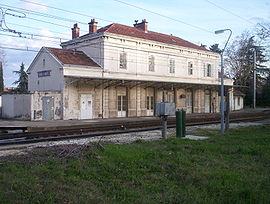Bourg-Saint-Andéol
| Bourg-Saint-Andéol | ||
|---|---|---|

The railway station
|
||
|
||
| Coordinates: 44°26′54″N 4°35′56″E / 44.4482°N 4.5989°ECoordinates: 44°26′54″N 4°35′56″E / 44.4482°N 4.5989°E | ||
| Country | France | |
| Region | Auvergne-Rhône-Alpes | |
| Department | Ardèche | |
| Arrondissement | Privas | |
| Canton | Bourg-Saint-Andéol | |
| Intercommunality | Rhône aux gorges de l'Ardèche | |
| Government | ||
| • Mayor (2014–2020) | Jean-Marc Serre | |
| Area1 | 43.74 km2 (16.89 sq mi) | |
| Population (2008)2 | 7,324 | |
| • Density | 170/km2 (430/sq mi) | |
| Time zone | CET (UTC+1) | |
| • Summer (DST) | CEST (UTC+2) | |
| INSEE/Postal code | 07042 /07700 | |
|
1 French Land Register data, which excludes lakes, ponds, glaciers > 1 km² (0.386 sq mi or 247 acres) and river estuaries. 2Population without double counting: residents of multiple communes (e.g., students and military personnel) only counted once. |
||
1 French Land Register data, which excludes lakes, ponds, glaciers > 1 km² (0.386 sq mi or 247 acres) and river estuaries.
Bourg-Saint-Andéol (Occitan: Bourg-Sant-Andiòu) is a commune in the Ardèche department in the Rhône Valley in southern France.
It lies directly along the Rhône River at the southeast end of the department 15 km (9.3 mi) south of the smaller see of Viviers, 4 km (2.5 mi) from Pierrelatte eastwards across the river in the département Drôme and 10 km (6.2 mi) from Pont-Saint-Esprit, in the north of the département of Gard. 14 km (8.7 mi) to the south-west starts the nearby Ardèche Gorges in Saint-Martin-d'Ardèche.
The Gallic settlement on a rocky peak over the Rhône river was called Bergoiata. Bourg-Saint-Andéol has one of the very rare testimonies of post-Roman and pre-Christian religions with its sculpted bas relief of God Mithra. It acquired its present name after Saint Andeolus, the 'apostle of the Vivarais', a disciple of St. Polycarp, supposedly arriving from Asia Minor, who evangelized the area under Emperor Septimius Severus, and was martyred in 208. The region was named Helvia in Julius Caesar's De Bello Gallico, with Alba-la-Romaine as capital city, then Vivarais from the mediaeval times after the see of Viviers, a region of Languedoc province during Ancien Régime until départements were created at the French Revolution. Due to the citizen's engagement for the Revolution, the town's name rejected a while the little known saint and was named Bourg-sur-Rhône. (At the Napoleonic times, Andéol had already been brought in back...)
...
Wikipedia



